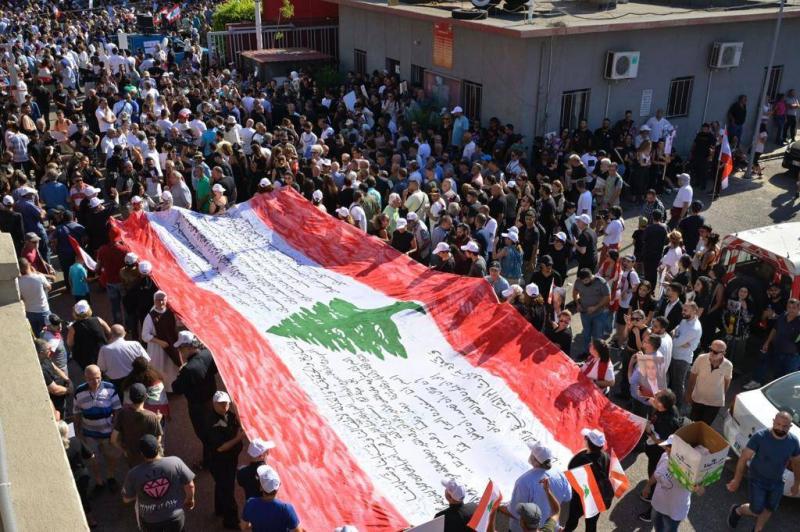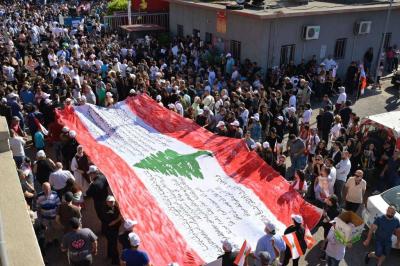Three years after the Beirut port explosion that shattered the city's landmarks and lives, life has partly returned and most buildings have been restored. However, those who departed will not return, remaining a painful memory every year at this terrifying moment: 6:08. Although attendance for this commemoration was modest compared to the past two years, as many Lebanese chose to spend the memorial day on the beach or in the mountains for the weekend, the call for justice persists in the port square, where tears are shed, and the will remains firm: justice must prevail next year.
#### The March
Hundreds of citizens, civil society activists, and several political figures commemorated the third anniversary of the August 4 explosion with a march that started from the Beirut Fire Brigade heading towards the expatriate statue opposite the Beirut port. The march was led by the families of the victims, who carried pictures of their loved ones and signs calling for "justice and accountability for the involved parties," alongside a number of political figures and MPs, including MP Marwan Hamadeh representing both Taymour Jumblatt, head of the "Democratic Gathering", and former MP Walid Jumblatt, as well as MP Ghassan Hasbani, and others.
Dozens of citizens arrived on foot from various areas, crossing the Fouad Chehab Bridge toward the celebration point, while security forces closed the route to central Beirut for vehicle traffic but kept the road toward Dora open. Participants in the march raised black flags and donned black clothing, expressing the immense sorrow represented by the anniversary.
The march was preceded by fire brigade vehicles that sounded their sirens, evoking deep emotions from the participants, who displayed banners accusing the state of committing the crime and obstructing the investigation, alongside signs holding Iranian occupation responsible and others calling for an international investigation into the port crime.
As the march reached the festival point, speeches began that emphasized the "necessity of holding accountable those responsible for the Beirut port explosion," blaming the state and political authority for "the destruction that occurred and for obstructing the investigation and issuing the indicative decision."
The march also experienced moments of tension and clashes as participants neared the Beirut port.
#### Fire Brigade
Under the slogan "For justice and accountability... We are continuing," Colonel Maher Al-Ajouz, commander of the Beirut Fire Brigade, stated that "when a fire occurs, we are not informed of its nature, and this is what happened on the fourth of August." He added, “Every day is the fourth of August, and when we enter the center and see the pictures of the martyrs, we remember that fateful day. The only consolation for the families is revealing the truth, that they lost their children while protecting the homeland and the capital.”
#### Families of Victims
In anger, the families of the port victims recalled the "stagnant" judicial proceedings over the past three years, seeking a truth that remains locked away. One father of a victim recalled his last goodbye to his daughter, stating, “We are the people who exploded but did not die, and we will demand justice until our last breath, and without justice, we won't have a homeland. We will not be able to tell our children in years to come that we stole, suppressed, and let our children be killed.”
William Noun criticized Hezbollah's attempts to obscure justice, saying, "Our demands are legitimate and the port bears witness, and every honest Lebanese must turn over any party involved in the crime." He added, "We tell foreign countries 'You have satellites, and the day will come when we know the truth.'”
Then, families recited their oath during the commemoration around the port.
#### Testimonials
Edgar Chiah, 58 years old, walked alone holding a picture of his aunt Therese in her youth. Therese was 70 years old when she was killed in the explosion that destroyed her apartment in Beirut. Edgar told Reuters in response to a question about the lack of accountability and the relatively small number of participants in the march compared to previous years, "It’s shameful." He added, "In two years, there will be no march. We will continue to suffer in silence."
Protesters blocked the main highway connecting the port with the Mar Mikhael neighborhood, an area busy with restaurants and bars that were destroyed in the explosion. Many of these stores and restaurants have been rebuilt painstakingly to welcome tourists and Lebanese expatriates even late Thursday night.
The streets of Beirut, usually teeming with pedestrians and shoppers on Fridays, were desolate, and shops were closed as memories of one of the most terrifying days in modern Lebanese history loomed overhead. However, announcing a day of national mourning throughout the country was not what everyone hoped for, both domestically and abroad.
Amnesty International stated that it is unacceptable for no one to be held accountable for this tragedy. Aya Majzoub, deputy director for the Middle East and North Africa at the organization, said, "Meanwhile, the authorities have used every tool at their disposal to undermine and obstruct the local investigation without shame to protect themselves from accountability and entrench a culture of impunity in the country."
#### The Ships
At 6:00 PM, the port of Beirut ceased operations, with workers standing in a moment of silence in honor of the victims of August 4. Ships sounded their horns, and cranes lifted their arms high.




